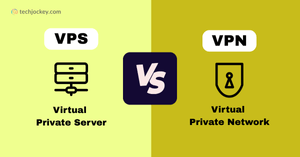What is Virtual Private Server (VPS)?
A VPS software offers levels of performance, flexibility and control somewhere between those offered by multi-tenant shared hosting and single-tenant dedicated hosting. While it might seem counterintuitive that the multi-tenant VPS arrangement would be called “private”—especially when single-tenant options are available. The term “VPS” is commonly used by traditional hosting providers to distinguish it from shared hosting, a hosting model where all the hardware and software of a physical machine are shared equally by multiple users.
In essence, VPS is a virtualized environment that imitates the functionalities of a dedicated server but at a more affordable cost. When you sign up to use a VPS, you are allocated a particular part of server resources, such as RAM, CPU and storage. Moreover, your VPS works independently from other users on a similar server, ensuring a high level of performance, security, and customization than shared hosting.
Key Features of Virtual Private Server (VPS)
Some notable features of virtual private server are root access, isolated environment, security, and scalability. Let’s look at all these attributes in more detail.
- Root Access: One of the most critical attributes of a VPS is root access. It provides you the complete control of your server and its functionalities, empowering you to install any software and configure the server as per requirement. Without the availability of root access, you will only have to work with the options given by your provider, which might restrict your website's security and performance.
- Isolated Environment: This is another critical feature in VPS management software, which means that your website will run its own server and will not share any resources with other sites. As your website will get dedicated resources, this will improve its performance and prevent it from getting slowed down due to other sites on a similar server. Additionally, an isolated environment also helps in enhancing security by limiting the data sharing between your website and others.
- Multiple operating systems: This is another important attribute of a VPS, as it allows you to select the operating system as per your website's needs. Moreover, it gives you much better flexibility to manage your server.
- Scalability: With VPS hosting, you get scalability, which allows you to easily upgrade as well as downgrade the resources of your server as needed. This flexibility allows you to adapt according to changing demands and scale the server resources according to the growth of your application or website.
- Security: In a VPS environment, you get a high level of security as it is isolated from others. VPS allows you to implement your own instant firewalls, security measures and configure settings to safeguard your data and server.
Major benefits of using a Virtual Private Server Management Software
Some of the major benefits of Virtual Private Server include enhanced performance, affordability, complete root access, and more. Let’s look at these benefits in more detail.
- Value and affordability: Even while a VPS often costs more than shared hosting, it is still significantly less expensive than dedicated hosting. When you compare the benefits of VPS to shared hosting, it is clear why a VPS is a far better investment, especially when you take managed VPS hosting into account.
- Enhanced performance: When numerous resources are completely dedicated to the requirement of your business, you get a much more effective and higher level of performance. Enhanced processing power leads to better site loading on your visitor's browser. It results in improved conversion rates, higher engagement and improvement in SERP ranking.
- Fully Managed Service: If you think that when you'll update your server to VPS means you'll have to operate your own server, then you must think again. Most hosting firms offer VPS hosting services and provide software and hardware updates with maintenance services. Moreover, they also offer security patches after regular intervals, hence you don't have to worry about operating and maintaining your VPS.
- Control and Access: When using shared hosting, site owners have little control over the installations made in their environment. But when you use VPS hosting, you get the power to only run services that are required. For instance, if you are not going to use the email functionality, you can simply shut down or even remove services like webmail or Bind applications from the server. You get complete root access to the VPS, so that you can make any modifications as per requirement.
- Save Money: VPS solutions are more economical than most people think. Owing to the advancement in virtualization management technology, there is a very good chance that prices will continue to fall. You can expect to save a lot of money by choosing a VPS, but still, it's recommended that you compare rates before choosing.
Who uses Virtual Private Server?
A Virtual Private Server is used by numerous organizations and individuals for a wide range of purposes.
- Small & medium-sized companies: Many small & medium-sized companies use VPS to host their web applications, websites and online services. VPS hosting gives them a budget-friendly solution that provides dedicated resources, customization, and scalability.
- Agencies and web developers: Agencies and web developers often depend on VPS hosting for deploying and managing their client's applications and websites. With VPS they get the flexibility to configure or modify the server environment as per their specific project requirements.
- Software Developers: VPS is used by software developers and testers for creating development as well as testing environments. Moreover, they can even have dedicated virtual servers for building and testing applications and simulating deployment scenarios.
- Gaming communities: VPS hosting is the preferred choice of online gaming communities as it provides the control, performance, and stability for hosting games, connecting multiple players and seamlessly playing online games.
What is the cost of VPS?
The approx. price of a VPS starts at $3.99/month. However, the pricing of a VPS can vary due to the features included & other factors like scalability, allocated resources, additional attributes, data center location, the choice of the operating system, and more.
Most top-rated VPS companies offer plans that are optimized for small and medium-sized businesses. Their VPS service is available on a per-month basis with unlimited bandwidth, free SSL certificate, malware scanner, 24/7 support and other benefits. Moreover, some providers also offer domain privacy and money-back guarantee to their customers.
- Latest Virtual Private Server (VPS) Trends: Virtual Private Servers (VPS) is one of the most popular hosting solutions and there are numerous trends shaping this industry. Let's dive in and take a detailed look at those trends.
- Cloud based VPS: Cloud computing is having a critical impact on the hosting domain, including VPS. The cloud-based VPS solutions have become the preferred choice of many businesses due to their high availability, security, and flexibility. With the help of cloud VPS, users can easily scale their resources according to demand and get failover capabilities and built-in redundancy.
- Managed VPS: Managed VPS services are gaining immense popularity, mainly among businesses without a dedicated IT team and non-technical users. Managed VPS companies handle maintenance, server setup, troubleshooting, security and allow business owners to focus on the main business activities.
- IPv6 Adoption: Owing to the depletion of addresses, most of the VPS providers are adopting IPv6, which is the latest generation of internet protocol. The IPv6 support gives better connectivity and larger address space, ensuring seamless accessibility and growth of VPS services.
- Security: Due to the increase in cyber threats, VPS providers are giving more importance to security measures. They are using robust firewalls, conducting regular updates, offering SSL certificates, and providing intrusion detection as well as prevention systems to ensure a secure hosting environment.
VPS Vs Shared Hosting Vs Dedicated Hosting
The table shows the difference between VPS, shared hosting, and dedicated hosting as per their performance, cost, control, and resources.
| Features | Virtual Private Server | Shared Hosting | Dedicated Hosting |
| Resources | Dedicated resources within a virtualized environment | Shared resources on a single server | Complete usage of all server resources |
| Performance | Better performance and scalability | Performance can be affected by other sites on the same server | Brilliant performance due to dedicated resources |
| Control | High level of control with administrative or root access control | Limited control with the access to a control panel | Complete control of the server |
| Cost | More expensive than shared hosting but it is less expensive than dedicated hosting | Economical option | Expensive hosting option |
Considerations When Buying VPS (Virtual Private Server)
When purchasing a VPS solution, there are numerous factors you need to keep in mind to choose the perfect option for your business. Here are some important considerations.
- Performance: Performance is extremely critical for the trouble-free functioning of your websites or applications. You should check if the VPS hosting provider offers features like guaranteed RAM, dedicated CPU cores and high-performance hardware like solid-state drives (SSDs)
- Uptime: Uptime is considered as one of the most critical factors when selecting a Virtual Private Server (VPS) host. You should always choose a provider that gives at least 99.9% of uptime, as it will ensure the smoother accessibility of your application of the website.
- Load Time: Loading time is another important metric you should consider. It decides how fast your application or website loads. This becomes more important when you're running an e-commerce store or any other website that requires quick loading time. Moreover, you should always compare load times and test multiple providers before taking a final decision.
- Support: It's important that you choose a provider that gives 24/7 support to resolve any VPS related issue with utmost dedication and as soon as possible. Owing to the round-the-clock, you can rest assured that help is always available when required.
- Free setup: Installing or setting up a Virtual Private Server can be a difficult task for users with limited technical capabilities. You can avoid this headache and speed up the deployment process by opting for a company that is ready to set up the VPS for your usage. Additionally, some providers will even do this free of cost.
What is VPS vs VPN?
A Virtual Private Server (VPS) is a form of virtual hosting that imitates the dedicated server environments and allow users to have their own secure hosting servers. On the other hand, VPN softawre is a cybersecurity service & technology that allows its users to remain completely anonymous or private while using the web.
| | VPS | VPN |
| What is it? | A hosting server for rent | It’s a cybersecurity technology |
| Used For? | Hosting applications and website | Used as service for security and online privacy |
| Benefits | Easy to host numerous websites Can be easily scaled | Hides the ID and helps in avoiding online tracking Bypasses censorships and blocks |
| Usage scope | Used by organizations, developers and businesses | Used by individuals for personal browsing |
What is the Difference Between VPS and VM?
A VPS is the virtualized version of the server in a much larger physical server infrastructure, and it is used for hosting websites and applications. A VPS offers much better flexibility, control, and performance than shared hosting and it is more affordable than a dedicated server. If we talk about a virtual machine (VM), it is a program that simulates the real computer system and allows multiple software environments as well as operating systems to run simultaneously on one single physical machine. VMs are primarily utilized for software testing, software development, server virtualization, and running different operating systems on a single computer.






























